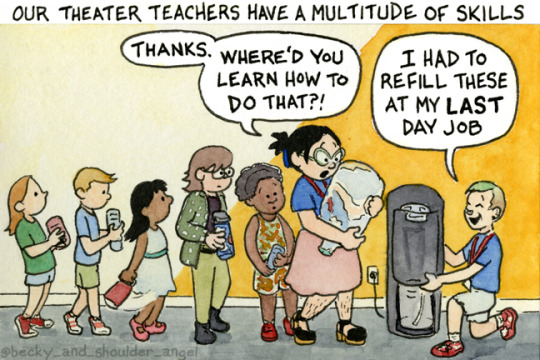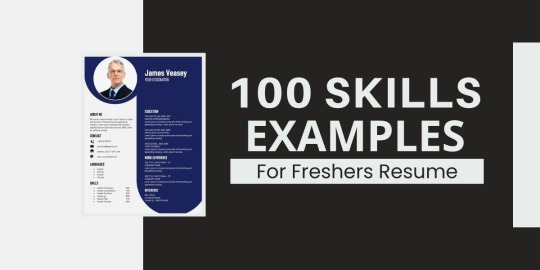#job skills
Text

#actorlife#watercolor#watercolour#day job#hidden talent#job skills#now i get to impress people with MY water cooler refilling knowledge
7 notes
·
View notes
Text
Navigating the Changing Landscape: Key Trends for Today's Job Seekers

The world of work is evolving rapidly due to technological, economic, and social shifts. For job seekers, this means new career opportunities but also new challenges. Tracking and understanding the latest trends is essential for job seekers to navigate the employment landscape effectively.
Recognizing these trends also allows employers to align their hiring practices with what today's candidates value most. This article will break down key developments shaping the experiences of job seekers in the modern era.
The Importance of Tracking Job Seeker Trends
Job seeker behaviors and priorities are not static. As the workforce and workplace culture changes over time, so do attitudes toward work. Ongoing trends reflect transformations in how people search for jobs, where they focus efforts, and what they expect from potential employers.
For job seekers, recognizing these trends allows tailoring of resumes, skills development, and more to align with employer priorities. When individuals showcase relevant skills and experiences sought by companies today, their candidacy becomes more competitive.
Key Job Seeker Trends to Follow
Technological Advancements Changing the Job Search Process
Online job boards like GradSiren increase accessible career opportunities for freshers and experienced candidates. Customized profiles allow matching with suitable roles.
Job seekers use job sites not just for listings but also for networking, company research, content sharing, and building an online professional brand.
AI plays an increasing role through resume screening, automated video interviews, and candidate evaluation algorithms. This provides efficiency but requires balancing human interaction.
Growing Popularity of Remote and Hybrid Work Models
Surveys consistently show over 75% of workers now want remote or hybrid work options. Many became accustomed to location flexibility during the pandemic.
Fully remote roles offer total flexibility. Hybrid arrangements blend on-site and remote work to balance benefits.
Companies insisting on fully in-office roles may struggle to attract applicants who desire flexibility.
Prioritizing Diversity, Equity, and Inclusion
Today's job seekers closely evaluate a company's diversity, equity and inclusion efforts when considering roles. They prefer employers who demonstrate real action on raising DEI.
Offering benefits supporting marginalized groups, transparent diversity statistics, anti-bias training, and review of inequities signals commitment to progress.
Companies lagging on DEI initiatives will have a much smaller talent pool to recruit from amid increasing candidate scrutiny.
Growth of the Freelance "Gig Economy"
Over 35% of the U.S. workforce now participates in freelance "gig economy" roles, with projections of continued increase. The flexibility to choose one's projects and hours has great appeal.
Freelancing is a temporary income source while individuals search for traditional full-time employment.
However, gig roles often confer fewer employee benefits and protections. Unpredictable income also poses challenges for workers.
Emphasizing Continuous Skills Development
Today's candidates understand the need to continually gain new skills rather than remain static in one job long-term. Employers facilitating ongoing career development are most attractive.
Workers independently take online courses, earn certifications, and build capabilities not just to change jobs but also to progress within roles.
Companies providing upskilling support and defined paths for internal mobility have a competitive edge in recruiting.
Factors Influencing Changes in Job Seeker Attitudes
Economic Growth Cycles: In strong economies with low unemployment, applicants have more leverage and higher demands. Recessions reverse this dynamic.
Generational Differences: Younger Millennial and Gen Z job seekers have expectations shaped by the technological era they grew up in. Priorities differ from older generations.
Technological Disruption: Developments like AI recruiting tools, virtual reality practice interviews, wearables tracking applicant biometrics, and more will transform jobs seeker experiences.
Cultural Shifts in Attitudes About Work: Discussions around mental health, work-life balance, and flexibility lead employees to expect employers to provide a healthy work culture supporting well-being.
Persistent Challenges Facing Job Seekers Today
Intensely Competitive Job Market: The oversaturation of qualified applicants means intense competition for available openings. This job seeker struggle has intensified coming out of the pandemic.
Skills Mismatch Between Employers and Applicants: Employers frequently request qualifications exceeding what roles require. Meanwhile, applicants cannot develop skills fast enough to keep pace with demands.
Mental Health Impacts: The strain and uncertainty of job-seeking take a psychological toll. Financial duress and rejection worsen mental health issues. But taking time to recover risks being left behind.
Continued Discrimination and Bias: Despite diversity initiatives, marginalized groups still face substantial barriers to equal opportunities. Achieving systemic change remains gradual.
Looking Ahead: The Future Job Seeker Landscape
As cultural acceptance grows, insisting on fully on-site roles will severely limit applicant pools. Hybrid arrangements will likely become the norm, appealing to work-life balance priorities.
While momentum on DEI is building, much work remains to create equitable access to opportunities. This will continue gaining focus from socially conscious job seekers.
Developments in VR recruiting, expanded AI capabilities, biometrics tracking, and more will transform how job seekers interact with employers. Ensuring ethics around data use will be crucial.
As automation changes workplace skill demands, job seekers will need continuous learning opportunities throughout their careers. Companies investing in upskilling will lead the way.
Reduced stigma and increasing workplace burnout will compel employers to prioritize emotional well-being through new policies. A healthy work-life balance will attract top talent.
Conclusion
Tracking emerging trends among job seekers provides crucial insights into the evolving employment landscape. Both individuals looking for work and companies hoping to attract talent must recognize these developments and shifting expectations. Also, modern job boards like GradSiren are essential for today's job seekers. Their customizable searches and alerts notify you of new openings matching your qualifications and keywords so you can instantly find and apply for relevant opportunities.
2 notes
·
View notes
Text
Navigating the Evolving Labor Landscape: Adapting to Technological Advancements
The European labor markets have undergone profound transformations since the early 1980s, redefining conventional notions of employment, unemployment, and work-life equilibrium. This article explores salient characteristics that have emerged within European labor markets, encompassing the ascendancy of marginal employment, heightened labor mobility, innovative retirement trajectories, and amplified work flexibility. These dynamics have blurred the demarcation lines between traditional work paradigms, offering both prospects and challenges to individuals striving to navigate their professional paths within this dynamic milieu.
Part 1: Shifting Dynamics in European Labor Markets
The European labor landscape has experienced a tectonic shift since the early 1980s. Marginal employment, typified by part-time or temporary roles, has ascended to prominence. This transformation is attributed to evolving corporate requisites, cost imperatives, and labor market regulations. Concurrently, labor mobility has surged, propelled by globalization, technological strides, and mutable skill prerequisites. Conventional retirement conventions have been disrupted, yielding novel retirement trajectories such as phased retirement and post-retirement work. Factors like increased life expectancy and pension system alterations have fueled this transformation. Additionally, a surfeit of flexible work arrangements, spanning flexible hours, remote work arrangements, and self-employment, has granted individuals autonomy while concurrently presenting challenges related to job security and work-life equilibrium.
Part 2: Influential Factors in Labor Market Transitions
The International Labor Organization (ILO) discerns the pivotal role of labor market transitions in the realm of future work. These transitions encompass fluxes between employment, unemployment, and inactivity, alongside transits between formal and informal sectors and shifts across diverse industries or vocations. An array of factors exerts influence over these transitions:
Economic Conditions: Economic vicissitudes, including recessions and technological innovations, can precipitate job reallocations. Economic expansion or contraction may engender novel employment avenues in specific sectors while curtailing opportunities in others.
Technological Advancements: Automation, artificial intelligence, and digitalization have reshaped industries and necessitated evolved skill sets, impacting labor market dynamics significantly.
Globalization: Escalating globalization has ramifications for job mobility, outsourcing, offshoring, and industrial competitiveness.
Demographic Shifts: Population demographic fluctuations, encompassing aging populations and birth rate fluctuations, can reverberate throughout labor markets, influencing labor supply-demand dynamics.
Education and Skills: Individual education and skill levels wield a discernible influence over employability and adaptability in response to evolving job prerequisites.
Labor Market Policies: Government policies, including those concerning employment protection, social security, minimum wage mandates, and labor regulations, can sculpt labor market dynamics.
Social Factors: Gender-related norms, discriminatory practices, social inequities, and cultural proclivities concerning work influence labor market outcomes and transitions.
Part 3: Technological Advancements Reshaping Industries and Occupations
Technological advances have markedly transformed an array of industries and job roles across Europe. Below are illustrative instances:
Automation and Robotics: Automation technologies have revolutionized sectors like manufacturing, logistics, and agriculture, augmenting efficiency and productivity through the implementation of automated assembly lines and robotic workforce.
Digitalization and Data Analytics: The ascent of digital technologies has wrought radical shifts in domains like finance, marketing, and healthcare. The advent of data analytics tools has empowered organizations to glean actionable insights from voluminous datasets, underpinning data-driven decision-making and personalized consumer experiences.
Internet of Things (IoT): IoT technologies have left an indelible imprint on industries encompassing transportation, energy, and healthcare. IoT-enabled smart grids optimize energy dissemination, while wearable health devices enable remote monitoring of vital signs.
Artificial Intelligence (AI): AI, encompassing technologies that mimic human intelligence, has left an indelible imprint on sectors like finance, customer service, and cybersecurity. AI-driven chatbots provide automated customer support, and AI algorithms detect fraudulent activities.
Augmented Reality (AR) and Virtual Reality (VR): AR and VR technologies have ushered in a paradigm shift in gaming, entertainment, and education. AR overlays digital information onto the tangible world, enriching user experiences, while VR engenders immersive virtual environments, facilitating training simulations and virtual tours.
Biotechnology: The domain of biotechnology has wrought a revolution in healthcare, agriculture, and environmental conservation. Gene-editing methodologies such as CRISPR-Cas9 enable precise modifications to DNA sequences, potentially heralding treatments for genetic disorders.
Part 4: Preparing for the Future of Work
In the backdrop of these burgeoning technological advances, individuals can prudently navigate the future of work by adopting the following proactive strategies:
Stay Informed: Diligently monitor technological trends by engaging with professional associations, attending industry symposia, and maintaining daily immersion in technology news.
Skill Augmentation: Enhance proficiency in technology skills pertinent to your domain, aligning your competencies with evolving industry requisites to remain competitive.
Lifelong Learning: Internalize the ethos of perpetual learning, availing yourself of online courses, certifications, and advanced degree programs to perpetually bolster your knowledge.
Networking: Forge robust professional networks to gain insights into nascent technologies, cultivate career prospects, and remain conversant with industry trends.
Adaptability: Cultivate adaptability and flexibility, readily embracing modifications in job roles and mandates, and demonstrating a disposition to acquire new proficiencies.
Problem-Solving Prowess: The ability to proactively tackle complex challenges and exercise critical thinking is pivotal in technology-infused vocations. Acquire these skills through rigorous practice, engagement in intricate projects, or problem-solving exercises.
Mentorship: Seek mentorship from seasoned industry veterans for valuable counsel concerning industry trends, career progressions, and personal advancement.
Part 5: Leveraging Strong Resumes and LinkedIn Profiles
In the milieu of this ever-evolving job landscape, the strategic deployment of a meticulously crafted resume and a compelling LinkedIn profile can serve as indispensable assets for job seekers. These pivotal tools facilitate differentiation and meaningful connections in an increasingly digital professional realm:
1. Resume: An impeccably tailored resume serves as a succinct dossier, spotlighting your competencies, experiences, and achievements. It should be meticulously crafted to not only underscore your qualifications but also underscore your adaptability in response to technological progression. Deploy industry-relevant keywords and accentuate your capacity for continued learning and adaptation.
2. LinkedIn Profile: A professionally cultivated LinkedIn profile empowers you to foster valuable networks, exhibit your expertise, and stay apprised of industry trends. Regular updates should reflect your latest skills, project involvements, and triumphs. Active participation in industry-relevant LinkedIn groups and contributions to discussions showcase your commitment to staying technologically current.
Conclusion
The future of work in Europe is an intricately woven tapestry, woven by evolving labor market dynamics and the rapid cadence of technological advancements. While these metamorphoses proffer a bounty of advantages, including augmented productivity and a heightened quality of life, they concurrently necessitate unwavering adaptability and ongoing skill enhancement from individuals. By actively absorbing knowledge, perpetually improving their proficiency, cultivating a proactive attitude toward learning and adaptation, and capitalizing on potent tools like meticulously constructed resumes and LinkedIn profiles, individuals can not only flourish within this dynamic milieu but also engender growth and prosperity within European labor markets. Embracing the future of work necessitates the embrace of lifelong learning and an unflinching commitment to personal and professional enrichment within an era marked by ceaseless technological evolution.
#jobhunt#jobsearch#resume writers in punjab#resume writers in chandigarh#resume writers in india#crisp writers#skills#job skills
2 notes
·
View notes
Text
Learn Programming Skills at Your Own Pace
If you're in search of a way to improve or change your career path in tech, I hope this can help you succeed.
Online resources for learning computer programming have become increasingly popular in recent years, with a wide variety of options available for individuals of all skill levels. Whether you are a complete beginner or looking to expand your knowledge, there are a few resources available that can help you achieve your goals. In this article, we will look at some of the best online resources for…

View On WordPress
#Career Development#Codeacademy#Coding#Coursea#Education#edX#Job Skills#Khan Academy#Learning#MOOC#Online Resources#Programming#Self-paced learning#Software Development#Udemy#Web Development
2 notes
·
View notes
Text

You don’t need a university degree to get the skills and certifications necessary to jumpstart a fulfilling career with good pay and benefits. In fact, many times, you can learn job-ready skills for industries like digital marketing, content publishing, IT, and much more online at a fraction of the cost of a traditional college degree. Read all the details in our blog ➡️ http://ow.ly/ICH850MbAtG
3 notes
·
View notes
Text
#action#adaptability#communication skills#communication with colleagues#conflict resolution#coping with change#creativity#dealing with challenges#dependability#emotional intelligence#empathy#flexibility#hard skills#integrity#interview preparation#interview questions#job interview#job readiness#job skills#learning from mistakes#managerial oversight#problem-solving#professional growth#questions & Answers#result#situation#skill development#soft skills#STAR method#task
0 notes
Link
#education #wellroundedindividuals #jobskills #debate #government #environment #responsibility #usefullifeskills #history #geography #finance #firstaid #coding #softskills #lifestylechanges #individualinitiative #academicdisciplines #cognitivethinking #career #balancedapproach #essaywriting
#education#wellroundedindividuals#jobskills#job skills#debate#government#balancedapproach#essay writing#essaywriting
0 notes
Text

#jobhunt#motivation#inspiration#job motivation#job applications#jobsearching#jobspell#job creation#job change#job tips#job training#job search#job support#job satisfaction#job seekers#job skills#spell craft#spell caster#spellcraft#spell work#spellwork#spellcasting#love spells#spell#spellbound#spells#job
0 notes
Text
Networking for Success: ScholarNest Technologies' Guide to Building a Meaningful Professional Network

In the dynamic landscape of today's professional world, building a robust network is crucial for career success. ScholarNest Technologies understands the significance of networking and provides a comprehensive guide to help individuals forge meaningful professional connections.
Key Strategies for Networking Success
Career Guidance and Counseling
ScholarNest emphasizes personalized career guidance and counseling sessions to assist individuals in understanding their strengths, weaknesses, and career aspirations. These sessions lay the foundation for strategic networking aligned with personal and professional goals.
Skill Development and Training
A successful network is built on a foundation of skills. ScholarNest offers skill development programs and training sessions that not only enhance professional capabilities but also provide opportunities to connect with industry experts and peers.
Leadership Development and Personal Branding
Networking isn't just about the quantity of connections but the quality. ScholarNest focuses on leadership development and personal branding to help individuals stand out in their professional networks. This includes effective communication, online presence, and thought leadership.
Professional Coaching and Advisory Services
The journey to success is often challenging, and ScholarNest provides professional coaching and advisory services. Whether navigating a career transition, seeking advice on workplace challenges, or aiming for professional growth, expert guidance is readily available.
Strategic Career Planning and Progression
Networking becomes more impactful when aligned with strategic career planning. ScholarNest aids individuals in creating a roadmap for their careers, identifying key milestones, and leveraging their network for career progression.
Unleashing Opportunities Through Networking
ScholarNest understands that networking is not just about attending events but about fostering genuine relationships. The emphasis is on creating a supportive community where individuals can share insights, collaborate on projects, and explore new career opportunities.
Unlock Your Professional Potential with ScholarNest
In conclusion, ScholarNest Technologies approach to networking goes beyond the conventional. It's about creating a thriving ecosystem where professionals can grow, learn, and succeed together. By combining career guidance, skill development, and strategic planning, ScholarNest ensures that your network becomes a powerful catalyst for your professional journey.
Invest in your networking journey with ScholarNest and embark on a path of continuous professional success.
#career guidance#career opportunities#skill development#career counseling#career development#career growth#career planning#career progression#job interview#job skills#leadership development#personal branding#personal growth#professional development#professional skills#career advancement#career advice#career coaching#career enhancement#career exploration#career pathways#career transition#professional growth#professional success#career advisory#career coaching services#career skills training#strategic career planning#success in the workplace#workplace excellence
1 note
·
View note
Photo

5 notes
·
View notes
Text

‼️ 100 Skills Examples For Freshers Resume (For All Jobs)
0 notes
Text
Why video games are more than just entertainment: Skills for the professional world
Unlocking Professional Skills: How Gaming Transforms Your Career Potential. 🎮💼
#VideoGames #CareerSkills #GamingBenefits #ProfessionalDevelopment
You’ve probably often heard that video games are a waste of time or that they have no real value beyond a few hours of entertainment. But what if I told you that the hours you’ve spent on ‘World of Warcraft‘ or ‘Civilization‘ have actually equipped you with skills that can be beneficial in the professional world? Yes, you read that right! Let’s dive deeper and discover which skills you can take…

View On WordPress
#Beyond entertainment#career#entertainment#gaming#job skills#professional skills#Skills#skills through gaming#success#Unlocking professional potential through gaming#Valuable#video games#Video games and professional skills#Work-related skills
0 notes
Text
Is procurement ready for the BIG LEAGUES?
What areas of skills development are a priority?
Great topic, Ulf Venne – Link to LinkedIn post/video titled Supply Chain Pioneers
The question is this: Are we ready to step into the spotlight of increasing expectations?
Early in the pandemic, I wrote an article for The Procurement Italia – Procurement Professional 2.0: Why our industry needs a talent reboot. – https://bit.ly/3KVzCom
For example, for the six consecutive years leading up to…

View On WordPress
0 notes
Text

Are you a Student? Looking for an internship?
#internships#jobseekers#employment#gradsiren#careeropportunities#entryleveljobs#usajobs#job search#career#job skills#internship opportunities#jobseeker#jobsinusa#jobsearch#employees#jobs
0 notes
Text
Tips To Pursue A New Career Path In 2023
Taking that leap of faith and pursuing a new career isn’t easy. If it was, then more people might be willing to leave their jobs in search of something that brings them more fulfilment. However, the path to starting a new career entirely is one that isn’t so easy. It often means a lot more hard work and graft to get into another industry and in some ways, start afresh.
It’s important to find…

View On WordPress
0 notes